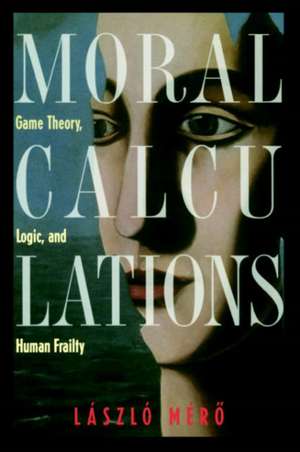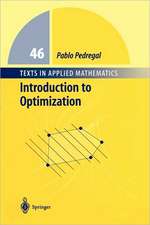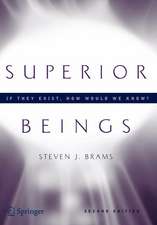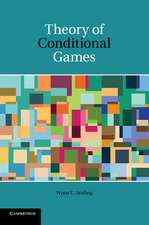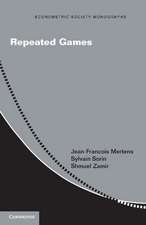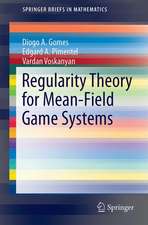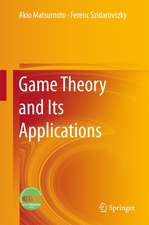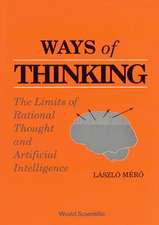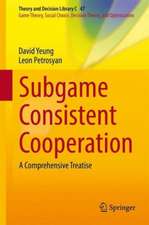Moral Calculations: Game Theory, Logic, and Human Frailty
Traducere de A.C. Gösi-Greguss Autor Laszlo Meroen Limba Engleză Hardback – 30 iun 1998
| Toate formatele și edițiile | Preț | Express |
|---|---|---|
| Paperback (1) | 303.51 lei 3-5 săpt. | |
| Springer – 16 oct 2012 | 303.51 lei 3-5 săpt. | |
| Hardback (1) | 312.10 lei 3-5 săpt. | |
| Springer – 30 iun 1998 | 312.10 lei 3-5 săpt. |
Preț: 312.10 lei
Nou
Puncte Express: 468
Preț estimativ în valută:
59.74€ • 61.56$ • 50.43£
59.74€ • 61.56$ • 50.43£
Carte disponibilă
Livrare economică 11-25 februarie
Preluare comenzi: 021 569.72.76
Specificații
ISBN-13: 9780387984193
ISBN-10: 0387984194
Pagini: 288
Ilustrații: XI, 276 p.
Dimensiuni: 155 x 235 x 21 mm
Greutate: 0.59 kg
Ediția:1998
Editura: Springer
Colecția Copernicus
Locul publicării:New York, NY, United States
ISBN-10: 0387984194
Pagini: 288
Ilustrații: XI, 276 p.
Dimensiuni: 155 x 235 x 21 mm
Greutate: 0.59 kg
Ediția:1998
Editura: Springer
Colecția Copernicus
Locul publicării:New York, NY, United States
Public țintă
Popular/generalDescriere
Are people ever rational? Consider this: You auction off a one-dollar bill to the highest bidder, but you set the rules so that the second highest bidder also has to pay the amount of his last bid, even though he gets nothing. Would people ever enter such an auction? Not only do they, but according to Martin Shubik, the game's inventor, the average winning bid (for a dollar, remember) is $3.40. Many winners report that they bid so high only because their opponent "went completely crazy." This game lies at the intersection of three subjects of eternal fascination: human psychology, morality, and John von Neumann's game theory. Hungarian game-theorist Laszlo Mero introduces us to the basics of game theory, including such concepts as zero-sum games, Prisoner's Dilemma and the origins of altruism; shows how game theory is applicable to fields ranging from physics to politics; and explores the role of rational thinking in the context of many different kinds of thinking. This fascinating, urbane book will interest everyone who wonders what mathematics can tell us about the human condition.
Cuprins
Games of Morality.- 1. Auction and Posing.- The Dollar Auction Game.- The Three Critical Points.- Out of the Party and into the Psych Lab.- High-Stakes Auctions.- Dollar Auctions in Everyday Life.- Dollar Auctions in the Wild.- Posing for a Random Period.- 2. The Brute as Hero.- Dice and the Common Interest.- A Martian Humankind.- The Protagonist Appears.- Game Theory.- Pure and Mixed Strategies.- Optimal Mixed Strategies.- Who Optimizes and Why?.- 3. The Prisoner’s Dilemma.- Two Logical Solutions.- On the Nature of Logic.- Everyday Prisoner’s Dilemmas.- Prisoner’s Dilemmas with Many Persons.- Iterated Prisoner’s Dilemmas.- Axelrod’s Competitions.- The Personality Traits of the Programs.- Tit for Tat in Sticklebacks.- Psychological Experiments with the Prisoner’s Dilemma.- The Significance of Phrasing.- 4. The Golden Rule.- Logic and the Golden Rule.- The Categorical Imperative.- The Categorical Imperative and Diversity.- The Gift of the Magi.- The Basic Forms of Two-Person Games with Mixed Motivation.- Chicken.- Asymmetric Games.- The Dollar Auction and Ethical Principles.- Cooperation and Rationality.- 5. The Bluff.- The World of Poker.- A Simple Poker Model.- The Evolution of the Poker Face.- The Poker Model Analyzed.- Bluff Big or Not at All.- Bluff as a Cognitive Strategy.- Nature’s Bluffs.- The Sources of Diversity.- 6. John von Neumann’s Game Theory.- The Case of the Schizophrenic Snail.- The Mathematical Background of von Neumann’s Theorem.- The Principle of Rationality.- Rational Players.- The Value of the Game.- Stone—Paper—Scissors.- Generalizations of von Neumann’s Theorem.- Games with Handicap.- The Part and the Whole.- 7. Competition for a Common Goal.- Purely Cooperative Games.- Mutual Fate Control.- Theoretical Considerations.- Experimental Evidence.- Asynchronous Decisions.- The Role of Being Informed.- The Rationale of Curfews.- On the Nature of Psychological Laws.- Cooperation by Competition.- 8. Hawks and Doves.- The Theory of Group Selection.- The Theory of Gene Selection.- Competition Between the Two Theories.- The Struggle Between Hawks and Doves.- Rationality in the Selfish Gene Theory.- Rationality in Group Selection Theory.- Complex Strategies.- 9. Socialism and Free Enterprise.- Economics and Evolution.- The Invisible Hand.- Theories of Equilibrium.- Planned Economies.- The Diversity of Mixed Economies.- The Logic of Evolution.- 10. Games Elementary Particles Play.- The Dual Nature of Light.- Two-Slit Experiments.- If You Ask a Stupid Question ....- Schrödinger’s Equation.- Probabilistic Frogs.- Chance as an Organizing Force.- Searching for the Grand Unified Theory.- The Great Game of Nature.- The Psychology of Rationality.- 11. Loves Me, Loves Me Not.- Schrödinger’s Cat.- Digression: “Poetic” Thoughts.- The Contingency of Human Concepts.- Stone—Paper—Scissors Redux.- The Cheating Innkeeper.- Quasi-rationality.- Plucking Petals.- Distancing.- 12. Rational Irrationality.- Correct Decisions Reached by Inadequate Methods.- Fortuities of Consciousness.- The Methods of Rational Decisions.- Meditative Techniques.- The Scientific Foundations of Meditative Techniques.- Ideomotor Techniques.- Today Thus, Tomorrow Otherwise.- Logic and Intuition.- 13. Collective Rationality.- Analysis of the Science 84 Game.- Outcome of the Million Dollar Game.- The Hidden Aim of the Game.- The Hiding Lottery.- The Smallest Number Wins Game.- The Means of Collective Rationality.- 14. The Heterogeneity of Human Thought.- Logically Isomorphic Tasks.- On the Role of Rationality.- Descartes’s Error.- Where Does Rationality Reside in Us?.- Games People Play.- Further Aspects of Games.- 15. There Are Many Ways to Nirvana.- The Nature of Rational Cognition.- The Nature of Mystical Cognition.- Rationality as a Technique of Distancing.- Beyond Rationality.- The Two Components of Thinking.- Game as Essence.- Nirvana.- References and Further Reading.
